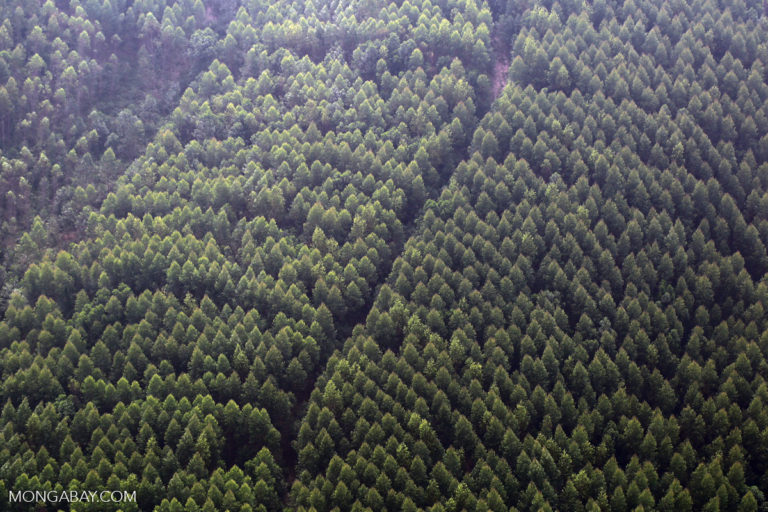- The policy, announced late last month, lays out purchasing guidelines for materials that go into the company’s clothing and packaging, especially wood pulp, paper, and wood-based fabrics like rayon and viscose.
- It also commits VF Corp to using products made with recycled fiber whenever possible, and to promoting the use of Forest Stewardship Council-certified paper and fiber when sourcing virgin materials.
- VF Corp owns such brands as The North Face, Timberland, Vans, and Wrangler, and is said to be the largest clothing conglomerate in the United States, with 2016 revenues topping $12 billion.
U.S.-based clothing conglomerate VF Corporation has adopted its first-ever forestry policy, aimed at eliminating deforestation and human rights abuses from its supply chain.
The policy, announced late last month, lays out purchasing guidelines for materials that go into the company’s clothing and packaging, especially wood pulp, paper, and wood-based fabrics like rayon and viscose. It also commits VF Corp to using products made with recycled fiber whenever possible, and to promoting the use of Forest Stewardship Council-certified paper and fiber when sourcing virgin materials.
VF Corp owns such brands as The North Face, Timberland, Vans, and Wrangler, and is said to be the largest clothing conglomerate in the United States, with 2016 revenues topping $12 billion.
“Deforestation and forest degradation continues to be a global issue affecting climate change and human rights,” said Letitia Webster, VF Corp’s Vice President of Global Corporate Sustainability. “This policy provides clear guidance across our many purchasing categories and it enables us to play our part in protecting the world’s forests.”
The production of wood pulp often entails the clearing of forests, which are turned into monoculture plantations of pulpwood species like eucalyptus or acacia, as well as a number of environmental and social issues that are frequently associated with deforestation, including biodiversity loss, forced labor, and the violation of indigenous peoples’ and local communities’ rights.
Nicole Rycroft, Executive Director of Vancouver-based NGO Canopy, told the Thomson Reuters Foundation that VF Corp’s new policy sends a signal that companies and consumers want sustainable fiber that isn’t tied to social conflict and environmental degradation.
“There’s 120 million trees that disappear into clothing every year, into rayon and viscose. A significant amount of that comes from endangered forest landscape,” Rycroft said. Many of those trees are from endangered forests, such as the tropical forests of Indonesia and the Amazon Basin as well as Canada’s boreal forest.
Demand for wood-based fabrics like rayon and viscose has continued to grow in recent years, which has not only led to more trees being cut down but also contributed to a dire situation for many forest-dependent peoples. “Traditional communities or indigenous communities not being adequately consulted or having free, prior, informed consent over their lands being developed for paper products, for pulp that feeds into the fashion industry, is fairly widespread,” according to Rycroft.
VF Corp partnered with Canopy in drafting its new forestry policy, and has also formally joined the CanopyStyle campaign, which aims to eliminate deforestation and social conflict from the global supply chain of wood-based fabrics by December 2017. VF Corp joins nearly 100 other companies already on board with the CanopyStyle campaign, including H&M, Levi Strauss & Co., Ralph Lauren, and Zara.
Several of the world’s largest viscose producers have worked with Canopy in developing new wood pulp-sourcing policies, as well. But Rycroft emphasizes the significance of a consumer company the size of VF Corp, which owns nearly 30 popular lifestyle brands, adopting a sustainable forestry policy.
“When an apparel giant like VF expands its forest commitment with a policy like this, it adds incredible momentum to global forest conservation and climate efforts,” Rycroft said in a statement accompanying the announcement of the policy. “From hang tags, to packaging, to fabrics, some of America’s favorite global brands are protecting the world’s forests and the species that call them home.”
